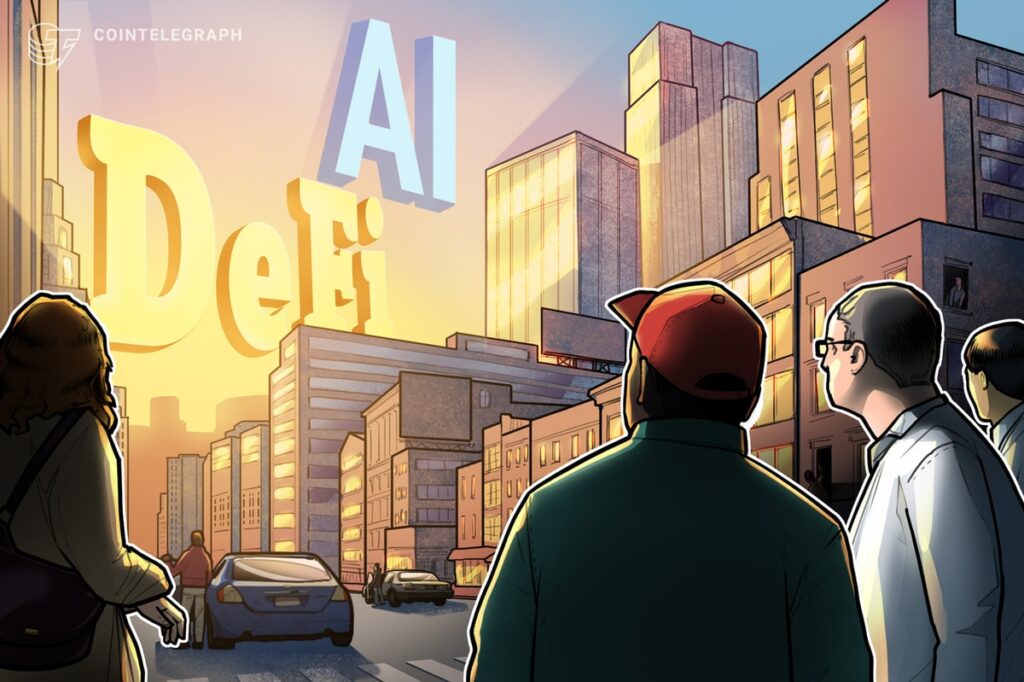The combination of AI and DeFi can benefit both industries.

Artificial intelligence (AI) and decentralized finance (DeFi) have been marketed as technologies that could change the world: according to experts, combining the two creates unparalleled opportunities in both industries.
DeFi is a financial service built on blockchain technology that primarily involves peer-to-peer transactions using smart contracts, eliminating intermediaries such as banks and giving individuals direct control over financial assets.
AI, on the other hand, is a technology that can mimic human intelligence and perform tasks such as decision making, problem solving and data analysis at high speed.
V, BNB Chain's Chief Scientist told Cointelegraph that AI's ability to efficiently analyze vast amounts of data, identify patterns, and make intelligent predictions will allow DeFi to scale operations, enhance security measures, and provide personalized services to users. Features such as auditing smart contracts and determining credit scores can be enhanced using AI.
“Decentralization of computing resources has the potential to create a fair and equitable AI ecosystem by providing a computationally powerful, cost-effective and energy-efficient infrastructure,” V said.
“The increasing complexity of AI algorithms poses challenges, but Web3 technologies, focused on distributed computing and open collaboration, provide a promising framework for advancing collaborative AI initiatives.”
According to Vi, “there are some initial synergies between DeFi and AI,” and combining AI with decentralized applications could improve both industries, perhaps adding use cases for crypto and blockchain technologies in the process.
V thinks that crypto and DeFi can introduce additional incentive mechanisms to decentralize the entire AI infrastructure in areas such as data markets and AI algorithm markets.
“If all data is treated as an asset, high-quality data will be more valuable,” he said. “As AI models are designed for different applications, these models can be marketed; users can choose and purchase models that best suit their needs, creating a demand-based marketplace focused on matching the right AI model to the right use case.”
However, V believes that integrating AI with DeFi platforms can bring exciting opportunities, as well as potential security challenges.
AI enables DeFi traders to implement trading strategies with AI-powered trading bots and predictive analytics to identify market trends. AI algorithms are prone to data manipulation, but if everyone relies on the same faulty data model, it can lead to losses.
Related: DeFi meets AI: Could this combination be the new focus of tech innovation?
Gary Gensler, chairman of the United States Securities and Exchange Commission (SEC), has expressed similar concerns about the use of AI in traditional financial markets by 2023.
According to Gensler, if major financial institutions start basing their decisions on the same data models, it could lead to herd mentality, undermine financial market stability and inadvertently cause economic collapse.
AI can help solve problems in DeFi and vice versa.
Sara Gherghelas, a blockchain analyst at Dapradar, told Cointelegraph that combining Web3 technology with AI could represent a “potential synergy.”
In her opinion, AI has the potential to solve problems in the DeFi space and vice versa to advance both fields, helping to make financial services more efficient, reliable and accessible. Gergelas thinks the critical question we face is not how we implement AI to maximize its benefits.
“AI's ability to analyze large data sets can enhance risk assessment, fraud and predictive analytics in DeFi,” Gergelas said.
“In contrast, DeFi's transparent and decentralized ledger AI is powered by robust and unbiased data, improving the accuracy and fairness of AI models.”
AI is already being used in the DeFi space to detect fraud, verify identity, and fight money laundering. Crypto exchange Binance started using AI to fight

If approached thoughtfully, Gergelas thinks the combination of Web3 and AI could transform sectors such as finance, healthcare and supply chain, providing new levels of efficiency and transparency.
“This integration has the potential for innovative applications, improved data privacy and robust AI models, thanks to the diverse and secure data sets provided by decentralized technology,” she said.
“However, it is important to explore challenges such as scalability and interoperability while addressing ethical and regulatory issues.”
Along with the excitement that AI can achieve, there is also great fear. Tech leaders like SpaceX CEO Elon Musk have been sounding the alarm about the misuse of AI, going so far as to call for a pause in AI development.
The United States and many other countries have taken steps to regulate AI development and prevent some of the predicted worst-case scenarios from becoming a reality.
So far, only Europe has made real progress. With the AI Act, the EU established a framework that imposes obligations on AI development, including testing, documentation, transparency and notification functions.
Gergelas believes that integrating AI into DeFi will require an entirely new regulatory landscape to address its implications, creating yet another headache for regulators struggling to keep up with the rapid growth of the AI industry.
Related: DePINs and AI set to become ‘power duo' by 2024, DeFi execs predict
“It's important to emphasize that AI is not just a temporary trend; It is here to stay and will increasingly become part of our daily lives,” said Gergelas.
“The key is to navigate this integration responsibly, ensuring that the deployment of AI is ethical, fair and aligned with societal values,” she added.
Concerns over AI-generated content have grown exponentially over the past few years. The World Economic Forum highlighted the negative effects of AI technologies in its 19th Global Risk Report.
The United Nations has called on AI stakeholders to address the spread of false information and to take “urgent and immediate” action to ensure the responsible use of AI.
As important as generative AI alarmism is, it shouldn't obscure the damage being done by digital technology that now enables the spread of hate speech, misinformation and disinformation.
Conflict and destruction
Threat to democracy and human rights.
Public Health and Undermining #ClimateAction. pic.twitter.com/XlisItDQIG
— Antonio Guterres (@antonioguterres) June 12, 2023
Profound liars have been pointed out as a cause of particular concern. AI video tech can create computer-generated images and sounds that are indistinguishable from the real thing. Deepfakes are already used in the film industry to reverse aging. However, there is a darker side to the technology.
Recently, US President Joe Biden appealed to the voters in the suspected conspiracy to rig the results of the 2024 election. Music superstar Taylor Swift has found herself the victim of fake images after AI was used to create online photos.
According to data from SumSub, deep fake data will increase tenfold globally from 2022 to 2023 across all industries.
Early days for AI and DeFi
Josh Tyson, director of creative content at OneReach.ai, told Cointelegraph that in his view, “decentralization and AI are inextricably linked — we're in the early stages of their relationship.”
“It seems that the wider adoption of AI could lead to a more decentralized world,” he said.
“As people get used to having conversations with AI and thinking of technology as a personal assistant, we'll start thinking about technology in terms of capabilities rather than apps.”
In particular, Tyson suggests that generative AI has the potential to be “a good data custodian when trained correctly” for the DeFi and Web3 open space.
AI systems rely on vast amounts of data to learn and make informed decisions. Specifically, chatbots are trained using large amounts of data and text to help them provide better, more informed responses.
Related: Can blockchain provide safeguards to keep AI on course?
Tyson thinks that software like OpenAI's Chatbots can provide reliable context about the foundations and evolution of Web3 and DeFi, which can be useful for users on “both customer sides.”
“Most of the issues in the DeFi space seem to be related to the pace of change; with the ever-changing array of NFTs, applications, platforms and decentralized exchanges, it's hard to get an initial understanding of the space,” he said.
“If generative AI can be used to create reliable, trustworthy and intuitive portals into space, this could revolutionize the industry,” Tyson added.












